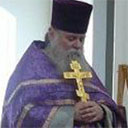Stories usually have heroes and villains, “good guys” or “bad guys.” The hero stands at the center of the story and is the model the teller wants us to identify with. Another character, the villain, is usually antagonistic to him. The villain’s behavior contrasts with the hero’s; he is the bad example whom we are not to follow.
In the Sunday Gospel readings leading up to Great Lent, we hear a series of familiar parables, stories told by our lord to illustrate His teachings and to steer us toward a deeper spiritual life. They give their names to these Sundays, “The Pharisee and the Publican” Luke 18: 10 – 14), “The Prodigal Son” (Luke 15: 11 – 32), and “The Last Judgment” (Matthew 25: 31 – 46).
The parables also have heroes and villains. Christ clearly intends us to identify with the Publican, not the Pharisee; the Prodigal Son, not His elder brother; the “Sheep” (the righteous), not the “Goats” (the unrighteous). Curiously, however, our Lord has not given us pure heroes and villains. The “good guys” are not very good, and Christ Himself underscores how much good there is in the villains.
Our Lord turns our ideas about heroes and villains upside down. The Pharisee is a good man in so many ways: “I fast twice a week; I give tithes of all I possess.” Moreover, he lacks the major vices; specifically, he denies that he is greedy, dishonest, or unchaste. Similarly, the prodigal son’s elder brother looks like a better example for the growing Christian. He was obedient and dutiful – quite a contrast to his wanton, licentious younger brother. Altogether, the parables paint the picture of two pious men striving to do what is right. The picture of “the goats” in the third parable is less clear. However, they are certainly puzzled by the Judge’s rebuke: “When did we see you … and not minister to you?” They have not been indifferent to their Master’s will but feel they have served Him faithfully.
The “Sheep” are equally puzzled; they are not aware of how well they have served their Master, though they have clearly done so. The other two parables introduce heroes more seriously flawed. The publican’s professional success depended on unrestrained greed; his social position encouraged uninhibited indulgence and unrestrained luxury. The prodigal son, incited by his youth and recklessness, originally sought such a life for himself.
The difference between the two groups, the heroes and the villains, is their attitude, the state of their heart. The Fathers tell us that sin produces disorder in the soul. This confusion is held in check only by our own zeal and love for God empowered by the grace of the Holy Spirit. One result of this disorder is that we fall prey to illusion, particularly regarding our true spiritual state. Satan works through illusion, especially in tempting those who have made some headway in the spiritual life. He tries to use against us our virtues and our sense of the progress we have made, just as some forms of self-defense use the attacker’s superior weight and strength against him. The illusion takes two forms: (1) making us think that we have achieved permanent perfection, forgetting that our continued health and progress depends upon the suppression of our passions through divine grace and vigilance, and (2) leading us to self-justifying comparisons with other people. This temptation encourages us to make superficial judgments about ourselves and others. In this deluded condition, we cannot know the true state of another’s soul, and we will not admit the true state of our own.
Self-delusion afflicts the “villains” in the parables. They have mastered the first levels of the spiritual life, but they have forgotten that they owe their initial success to the Spirit’s grace as well as to their own zeal, they have relaxed their vigilance over the passions (which are only suppressed, not driven out), and they have turned to condemning others rather than repenting of their own sins in humility.
This last especially besets the Pharisee and the elder brother, as we see in their reaction to the publican and the prodigal. One who is aware of his own sinfulness, his own spiritual struggle, his own helplessness in that struggle without the living presence of Holy Spirit – such a person cannot condemn a brother or sister. We are not called to condone the sins of others; we are warned against despising the sinner. As St Theophan the Recluse notes, “It is possible to judge quite simply, without bringing in a verdict against the person we judge. And if at the same time we feel pity in our heart for the person at fault, sincerely desiring his amendment of life and praying that he may do better in future, then there will be no sin in judging but, on the contrary, to judge him would he as much an act of love as is possible in such a case.” The elder brother should have celebrated his brother’s repentance; the Pharisee should have rejoiced to see a publican humbling himself in prayer.
The heroes of the parables, on the other hand, painfully realize their moral and spiritual bankruptcy. In the parables Christ plays on our natural desire to side with the hero. Thus He prompts us to identify with the sinful and the repentant. Both the heroes and the villains share with us our common sinfulness and moral weakness. What makes spiritual heroes is that they confront their sins with “a humble and contrite heart” (Psalm 50: 17). What makes spiritual villains is not their sin, but their attitude of self-righteousness and self-satisfaction. As we approach Great Lent, let us lay aside our spiritual delusion, and let us empty our hearts in repentance before the forgiving Lord.
***


